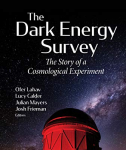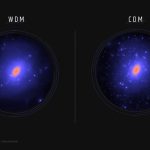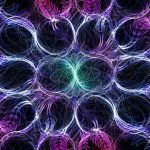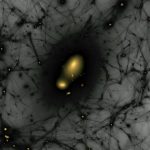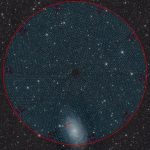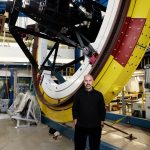Fermilab CPC scientist Juan Estrada has been selected as the recipient of the 2020 DPF Instrumentation Award (senior category), with the citation: “For his creation and development of novel applications for CCD technology that probe wide-ranging areas of particle physics including cosmology, dark matter, neutrino detection and quantum imaging.” He will be honored in the… More »
Author Archive
The Dark Energy Survey book is out! “The Dark Energy Survey: The Story of a Cosmological Experiment” tells the story of the DES project from original conception, the design and construction of DECam, early science results, and cosmological measurements with the first year of DES data. The book includes chapters written for a non-specialist reader… More »
Fermilab CPC scientist Javier Tiffenberg, along with collaborators Rouven Essig (Stony Brook University), Tomer Volansky (Tel Aviv University), and Tien-Tien Yu (University of Oregon) have been awarded the 2021 New Horizons in Physics Prize “For advances in the detection of sub-GeV dark matter especially in regards to the SENSEI experiment.” Congratulations Javier and the… More »
Scientists in the Dark Energy Survey released results that have been five years in the making. Researchers used the world’s most complete census of dwarf galaxies around our Milky Way galaxy to probe the nature of dark matter, an invisible form of matter that dominates the universe. These new measurements provide information about what dark matter… More »
Join the CPC’s own theoretical physicist Dan Hooper as he joins with NYU PhD student Shalma Wegsman to answer some of the deepest questions about dark matter, black holes, quantum mechanics, and more. “Why this Universe?” is a new podcast that seeks to break down some of the biggest ideas in physics into easily digestible… More »
In an article submitted to Physical Review D, CPC members Noah Kurinsky and Gordan Krnjaic collaborate with Dan Baxter (KICP) and Yoni Kahn (UIUC) to present a novel interpretation of excess events observed at various low-threshold dark matter searches. They found that the anomalous results across various detectors operating in dramatically different experimental conditions could… More »
Over the past five years, the Dark Energy Survey, a DOE-funded project led by Fermilab, has revolutionized our view of small satellite galaxies. DES discovered a large number of tiny galaxies close to the Milky Way’s largest satellites, the Magellanic Clouds, suggesting that multiple galaxies may have been captured by the Milky Way at the… More »
The Dark Energy Spectroscopic Instrument seeks to further our cosmic understanding by creating the largest 3-D map of galaxies to date. Below is a press release issued by Lawrence Berkeley National Laboratory announcing first light for this extraordinary instrument. The U.S. Department of Energy’s Fermi National Accelerator Laboratory is a key player in the construction of… More »
The Department of Energy has awarded Fermilab and University of Chicago scientist Josh Frieman $1 million over three years as part of the inaugural Office of Science Distinguished Scientist Fellowship program. Office of Science distinguished scientist fellows were chosen from nominations submitted by nine U.S. national laboratories. Frieman is one of only five scientists selected,… More »












